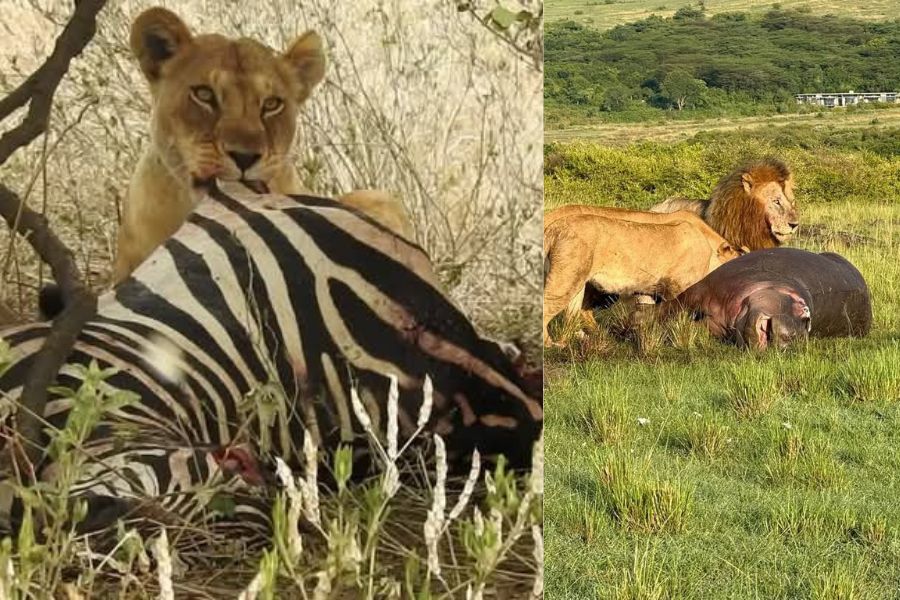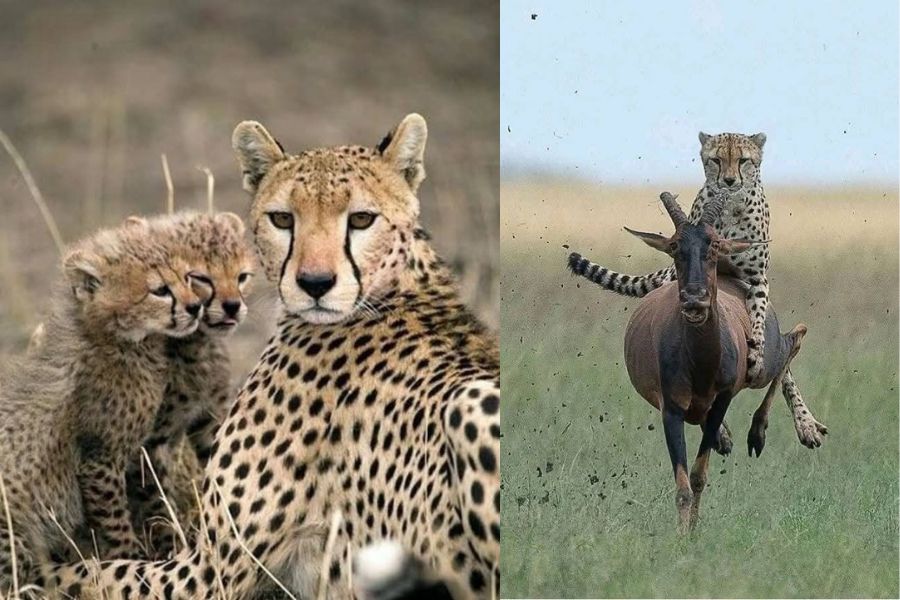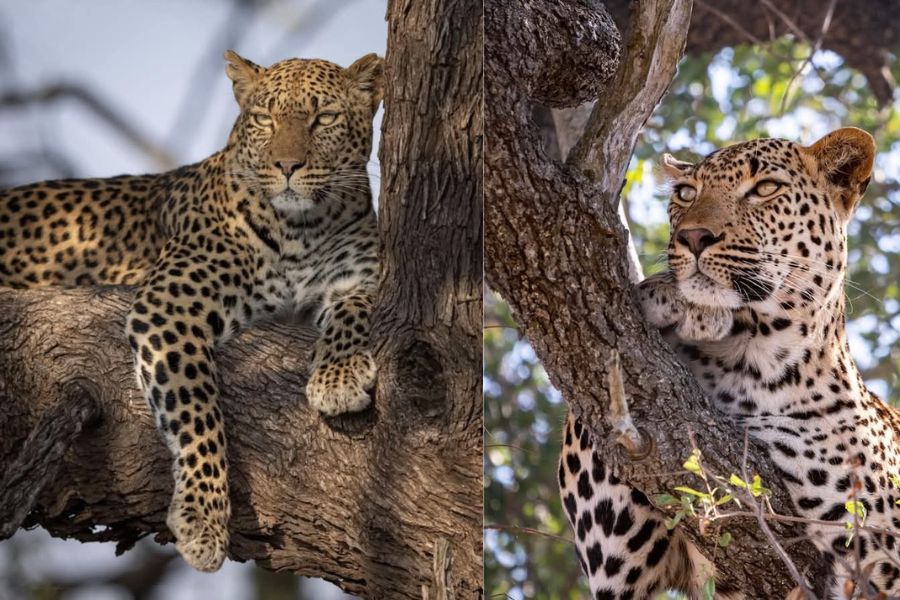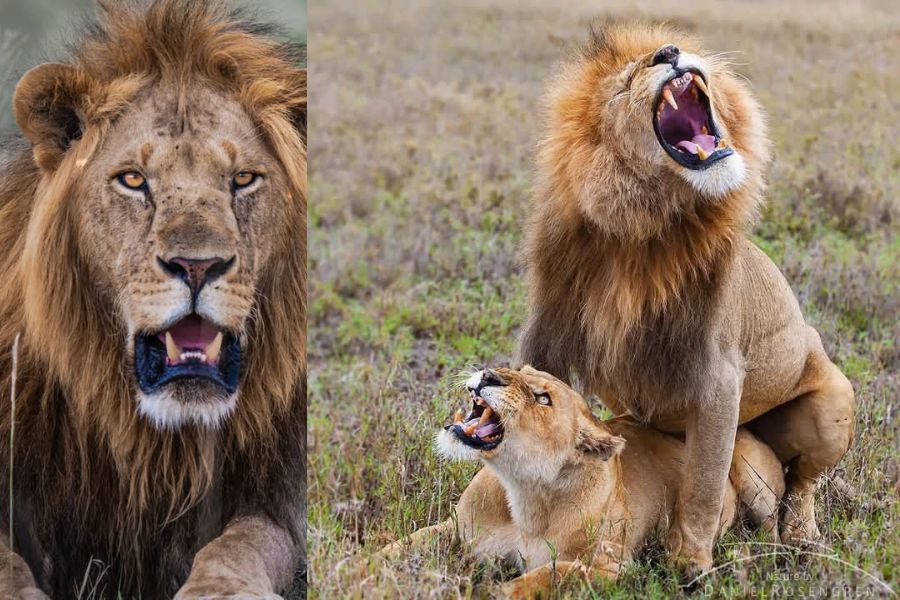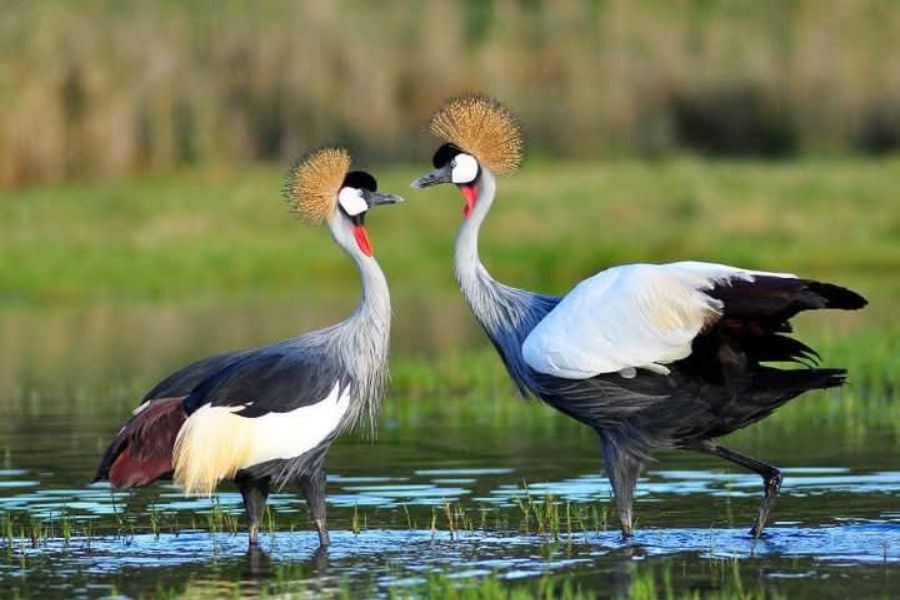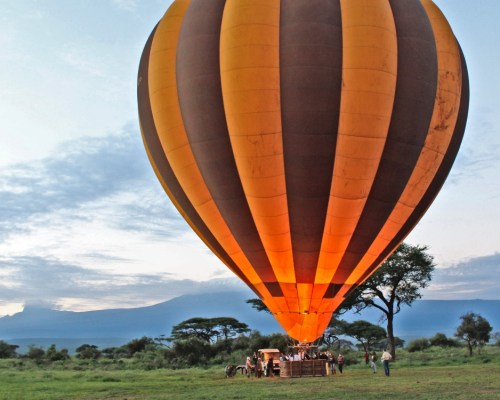
Top Places to Visit in Kenya and Tanzania Safari (With Culture & Wildlife Combined!)
An Easy, Expert Guide by Blavals Safaris
Why Kenya and Tanzania Are a Safari Dream Come True
Top Places to Visit in Kenya – Wildlife & Culture
1. Karen Blixen Museum & Giraffe Centre – A Taste of Colonial Kenya
2. Lake Elmenteita & Soysambu Conservancy – Flamingos, Game, and the Maasai
3. Maasai Mara National Reserve – Wildlife Royalty + Maasai Culture
4. Amboseli National Park – Elephant Kingdom & Kamba Craftsmanship
South Kenya
Top Places to Visit in Tanzania – Safari Meets Heritage
5. Tarangire National Park – Elephant Herds & Barabaig Traditions
6. Lake Manyara National Park – Tree-Climbing Lions & Iraqw Community
7. Ngorongoro Crater – Nature’s Amphitheatre & Hadzabe Hunter-Gatherers
Planning Tips for a Cultural & Wildlife Safari
Best Time to Visit:
Visa Tips:
What to Pack:
Guided Tours Are Best
Sample 10-Day Kenya & Tanzania Cultural Safari
Day 1: Arrival in Nairobi – Karen Blixen Museum + Giraffe Centre
Day 2: Maasai Mara Game Drive + Maasai Village Visit
Day 3: Optional Balloon Safari, Transfer to Amboseli
Day 4: Amboseli Game Drive + Kamba Cultural Tour
Day 5: Cross into Tanzania, explore Tarangire + Barabaig Visit
Day 6: Game Drive in Lake Manyara + Iraqw Experience
Day 7: Explore Ngorongoro Crater
Day 8: Hadzabe Cultural Experience
Day 9: Olduvai Gorge + Datoga Community
Day 10: Departure
Yes! All cultural visits with Blavals are ethically arranged, with full consent and benefit going to the local communities. We prioritize authenticity and mutual respect.
Yes, you can choose safari packages with built-in cultural days or add them as optional excursions.
Common cultural visits include:
Yes, but we recommend contributing through community projects or locally guided purchases to ensure fair impact.
Absolutely. Cultural safaris are engaging for kids and adults alike, helping younger travelers connect meaningfully with people and places.
Ready to Explore Kenya & Tanzania with Heart?
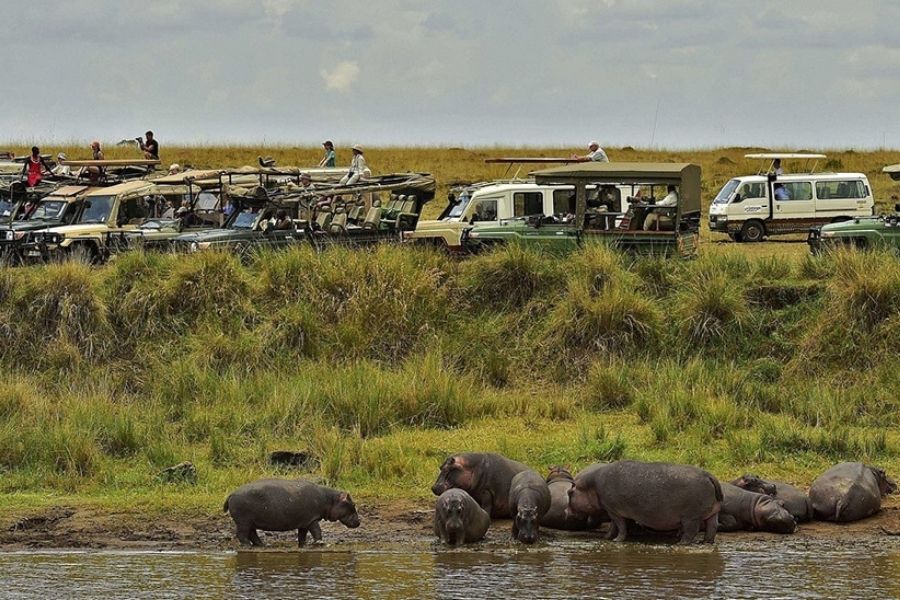
What to Know Before You Travel.
Passports and Visas.
Visa:
Entry Requirements for U.S. Passport Holders.
TSA PreCheck:
CBP Global Entry Program:
Double Entry and Multiple Entry Visas.
Non-U.S. Citizens
Single Entry eVisa:
East Africa Tourist Visa:
Flight Preparation to Kenya from the USA?
Luggage & Packing
Carry on Luggage.
Destination Landing and Eventual Departure.
Transfer.
About Your Tour Participants in Kenya.
About Your Accommodations.
Electricity in Safari Camps.
Hotel Check-in/ Check-out.
Gratuities.
Suggested Tipping: Kenya & Tanzania
Overland Sightseeing.
Independent Activities.
Currency.
Cards — Credit.
Souvenir Shopping.
Staying Healthy While Traveling
You can take several easy steps to stay healthy while traveling, which may help prevent contracting an illness while away from home.
- Watch what you eat.
- Information on vaccinations and other health precautions, such as safe food, water precautions, and insect bite protection, may be obtained from the Center for Disease Control and Prevention's hotline for international travelers at 1-877-FYI-TRIP (1-877-394-8747) or via the CDC website.
How many safari parks are in Kenya?
Know what Kenya is famous for.
Which is the best place for Kenya Wildlife Safari?
What is the best month to go on an African safari?
|
City |
|
Jan |
Feb |
Mar |
Apr |
May |
Jun |
Jul |
Aug |
Sep |
Oct |
Nov |
Dec |
|
Nairobi, Kenya |
Low |
63 |
64 |
66 |
68 |
66 |
63 |
63 |
63 |
64 |
66 |
66 |
63 |
|
|
High |
77 |
78 |
77 |
75 |
73 |
73 |
72 |
72 |
74 |
78 |
76 |
80 |
|
Samburu, Kenya |
Low |
75 |
75 |
73 |
75 |
73 |
73 |
70 |
70 |
73 |
73 |
75 |
80 |
|
|
High |
88 |
88 |
87 |
85 |
82 |
82 |
80 |
84 |
84 |
85 |
85 |
90 |
|
Masai Mara, Kenya |
Low |
63 |
64 |
66 |
68 |
66 |
63 |
63 |
63 |
64 |
66 |
66 |
63 |
|
|
High |
81 |
81 |
81 |
80 |
80 |
78 |
77 |
77 |
78 |
80 |
81 |
81 |
Climate & Clothing
NB: Wi-Fi can be extremely slow, unreliable, and sometimes nonexistent in developing countries.
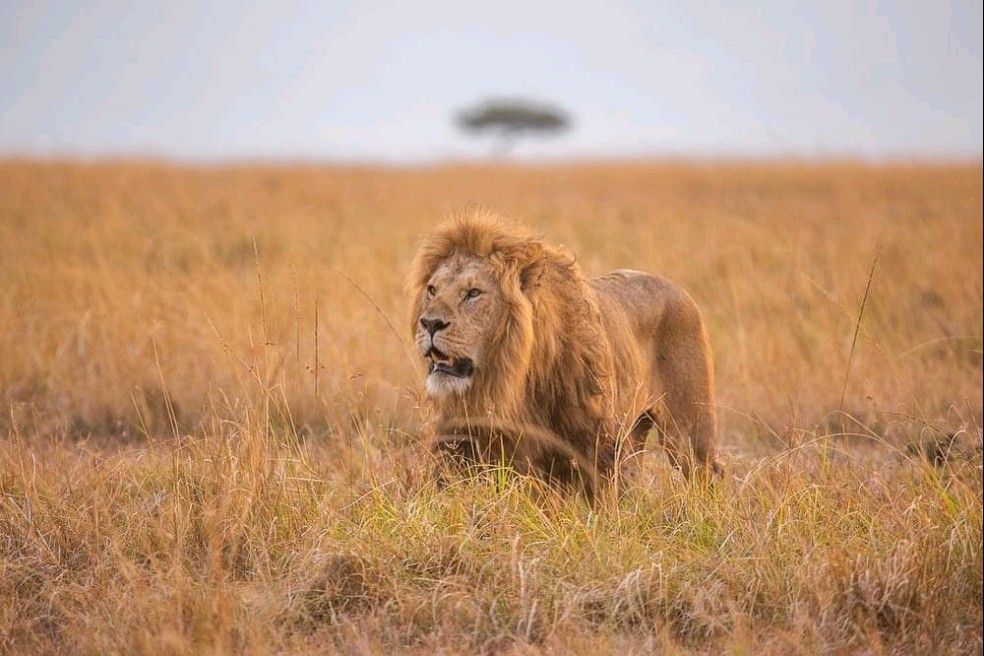
Visas To Eta System.
You Require An Electronic travel Authorization (eta).
Requirements - All Travellers
Requirements - Depending On Country Of Residence / Travel History
Address For Referred Eta Communication:
Related Information On Eta Application:
Approval Time:
Auto Save:
Safari And Roads In Kenya:
Credit Cards:
Vaccination:
Accommodation on Safari: Masai Mara Tented Camps, Eco-friendly Lodges in Kenya
Our eco-friendly Kenya lodges immerse you in nature without compromising modern comforts. Think private decks overlooking savannahs, ensuite bathrooms, and amenities like swimming pools (available in most accommodations except tree lodges).
Live the safari dream in Masai Mara tented camps built on permanent foundations. These aren’t basic setups—you’ll enjoy hot water bottles at bedtime, sunrise coffee delivered to your tent, and ensuite bathrooms.
Our budget Kenya safari stays still deliver charm, with cozy rooms and communal firepits for swapping stories under the stars.
Drinking Water And Bottled Drinks:
Suggested Packing For A Kenya Safari: 2025 Essentials & Eco-friendly Tips
Kenya bans plastic bags, so pack eco-friendly safari packing gear like reusable fabric toiletry bags and waterproof duffels. Pro tip: Even duty-free plastic bags are confiscated on arrival! For lightweight luggage Kenya flights (15kg limit on small planes), prioritize versatile clothing and leave extras at your Nairobi hotel.
Photography Equipment on Safari: Essential Gear for Kenya Wildlife Photos 2025
Must-Have Safari Photography Gear:
Pro Tips for Budget Safari Cameras:
Why Go Pro?
Final Checklist:
Suggested Equipment List For Safari
Best Time For Kenya Safari: Masai Mara Migration & Seasonal Guide 2025
January-March (High Season):
April-May (Low Season/Long Rains):
June (Post-Rain Sweet Spot):
July-October (Peak Migration):
November-December (Shoulder Season/Short Rains):
|
Statistics
|
▫️JAN
|
▫️FEB
|
▫️MAR
|
▫️APR
|
▫️MAY
|
▫️JUN
|
▫️JUL
|
▫️AUG
|
▫️SEP
|
▫️OCT
|
▫️NOV
|
▫️DEC
|
|
Rain (mm)
|
58
|
50
|
92
|
242
|
190
|
39
|
18
|
24
|
31
|
61
|
150
|
108
|
|
Rain days
|
4
|
4
|
8
|
15
|
13
|
5
|
3
|
4
|
4
|
7
|
14
|
9
|
|
Day Temp
|
26
|
27
|
27
|
25
|
24
|
23
|
22
|
23
|
25
|
26
|
24
|
24
|
|
Night Temp
|
11
|
11
|
12
|
13
|
12
|
10
|
9
|
9
|
10
|
11
|
13
|
12
|
|
Sunshine hours
|
288
|
266
|
267
|
204
|
189
|
159
|
130
|
127
|
180
|
226
|
198
|
257
|
Safari Clothing:
Currency:
Custom Duty Kenya:
Safari Driver / Guide:
Electricity:
Important Info
Fees & Taxes:
Game Trophies:
Kenya Safari Gratuities/tipping Guide:
Travel Insurance:
Languages:
Laundry:
Meals:
Medical Facilities:
Kenya Travel Safety & Cultural Etiquette:
Safari Souvenir Shopping: Maasai Beadwork, Nairobi, Tanzanite Gemstones
Transfers To And From The Airport
Safari Transportation:
Plan Transfers Efficiently With These 2025-approved Distances:
Masai Village Visit At Masai Mara
Lunch And Drinks During Safari
Time Difference:
Mosquito Net:
Charging Of Mobile Phones And Other Electrical Items
Check In / Out Of The Hotels
Important Items To Bring Items To Bring With You
Here Are Some Essential Items That You Should Carry In Your Hand Luggage.
Book Your Safari Today!
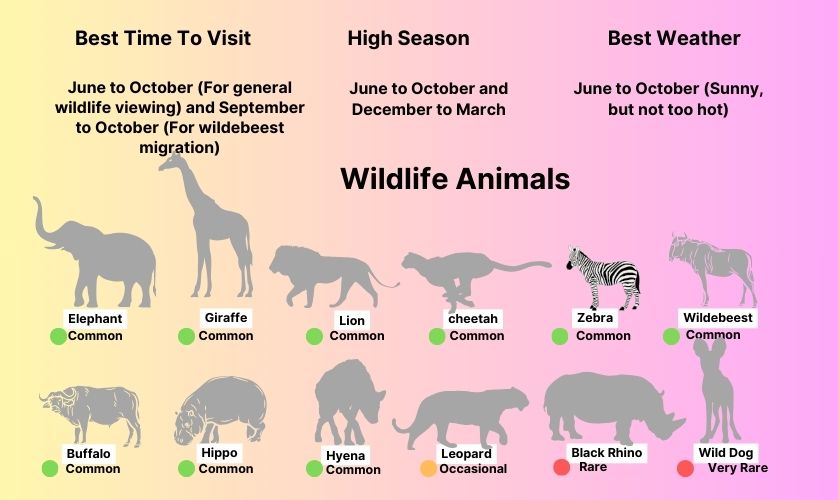
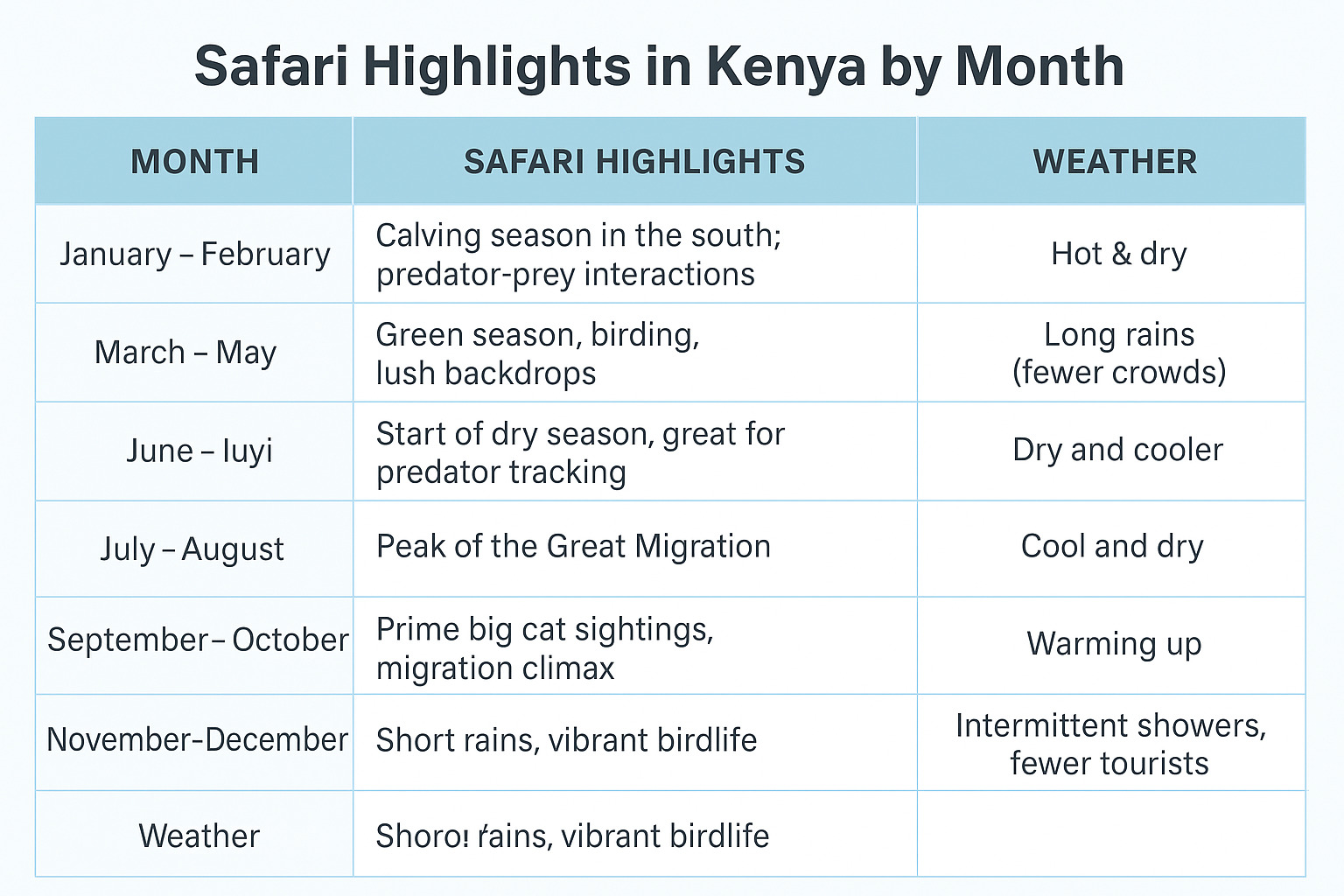
When to Visit Kenya: The Ultimate Guide to Wildlife Safari Seasons
Why Timing Your Safari in Kenya Matters
Dry Season (June to October): Peak Safari Experience
Wildlife Highlights:
Green Season (November to May): Lush, Affordable & Underrated
|
Green Season Benefits |
Description |
|---|---|
|
Fewer tourists |
More intimate safari experiences |
|
Lush scenery |
Perfect for photography and vibrant flora
|
|
Baby boom |
Many animals give birth during this time
|
|
Migratory birds |
Species from Europe and Asia flood Kenyan skies
|
If you're traveling as a family and prefer off-peak travel dates with enriching animal interactions, this period aligns beautifully with packages like the 10-Day Kenya Family Safari.
Special Safari Moments: What to Expect Each Month
|
Month
|
Safari Highlights
|
Weather
|
|---|---|---|
|
January – February
|
Calving season in the south; predator-prey interactions
|
Hot & dry
|
|
March – May
|
Green season, birding, lush backdrops
|
Long rains (fewer crowds)
|
|
June
|
Start of dry season, great for predator tracking
|
Dry and cooler
|
|
July – August
|
Peak of the Great Migration
|
Cool and dry
|
|
September – October
|
Prime big cat sightings, migration climax
|
Warming up
|
|
November – December
|
Short rains, vibrant birdlife
|
Intermittent showers, fewer tourists
|
The Great Wildebeest Migration: July to October
Romantic Safari? Choose the Shoulder Seasons
Safari Timing Based on Travel Type
|
Traveler Type
|
Best Months Jul – Oct
|
Reasons
High wildlife density, peak visibility
|
|---|---|---|
|
Birdwatchers
|
Nov – Apr
|
Migratory birds arrive
|
|
Photographers
|
Mar – May
|
Vibrant colors, dramatic skies
|
|
Families with Kids
|
De, Feb,
Aug
|
School holidays + accessible safaris
|
|
Couples & Honeymooners
|
Jun, Oct
|
Fewer crowds, excellent weather
|
Top Safari Destinations and Their Peak Seasons
Maasai Mara National Reserve
Amboseli National Park
Samburu and Laikipia
Advantages of Visiting in the Low vs. High Season
Low Season: Fewer Crowds, Greener Landscapes
High Season: Abundant Wildlife and Dry Trails
Special Events and Wildlife Experiences by Season
The Wildebeest River Crossings
Birdwatching Highlights
Cultural Festivals and Tribal Ceremonies
Travel Tips Based on the Time of Year
Weather & Packing Essentials for Your Safari Month
Booking and Budget Considerations
Avoiding the Crowds: Low-Season Travel Tips
To make the most of these months:
◾ Opt for luxury tented camps with all-weather access
◾ Use local guides who can track elusive animals even in dense bush
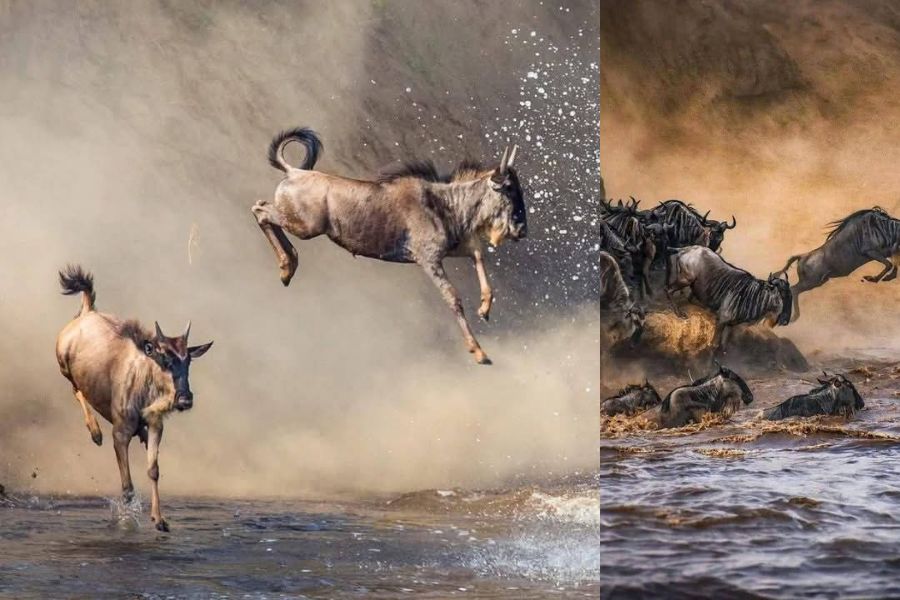
Frequently Asked Questions (FAQs)
July to October is considered the best due to the Great Migration and dry weather.
Yes, especially for photographers, birdwatchers, and budget travelers. Just prepare for some muddy roads.
April, May, and November typically offer the lowest prices.
Yes, safaris are safe year-round when booked through reputable operators.
Absolutely. Parks like Maasai Mara and Amboseli have resident populations viewable all year.
For peak season (July–October), book 6–12 months ahead. For the low season, 1–3 months is usually fine.
Final Thoughts: Timing Is Everything
